Abstract
We investigated the effects of low-dose eicosapentaenoic acid (EPA) and docosahexaenoic acid (DHA) on the incidence and growth of 7,12-dimethylbenz(a)anthracene (DMBA)-induced mammary carcinoma in rats fed a high-fat (HF) diet. We also examined the effects of these treatments on the fatty acid composition of tumour and serum. Tumour incidence was significantly decreased by the administration of low-dose EPA and DHA, whereas their inhibitory effects on tumour growth did not reach significance. Serum arachidonic acid (AA) level was decreased by the administration of low-dose EPA and tended to be decreased by the administration of low-dose DHA, whereas tumour AA levels were not changed. The administration of low-dose EPA and DHA may be useful for inhibiting the incidence of breast cancer.
Full text
PDF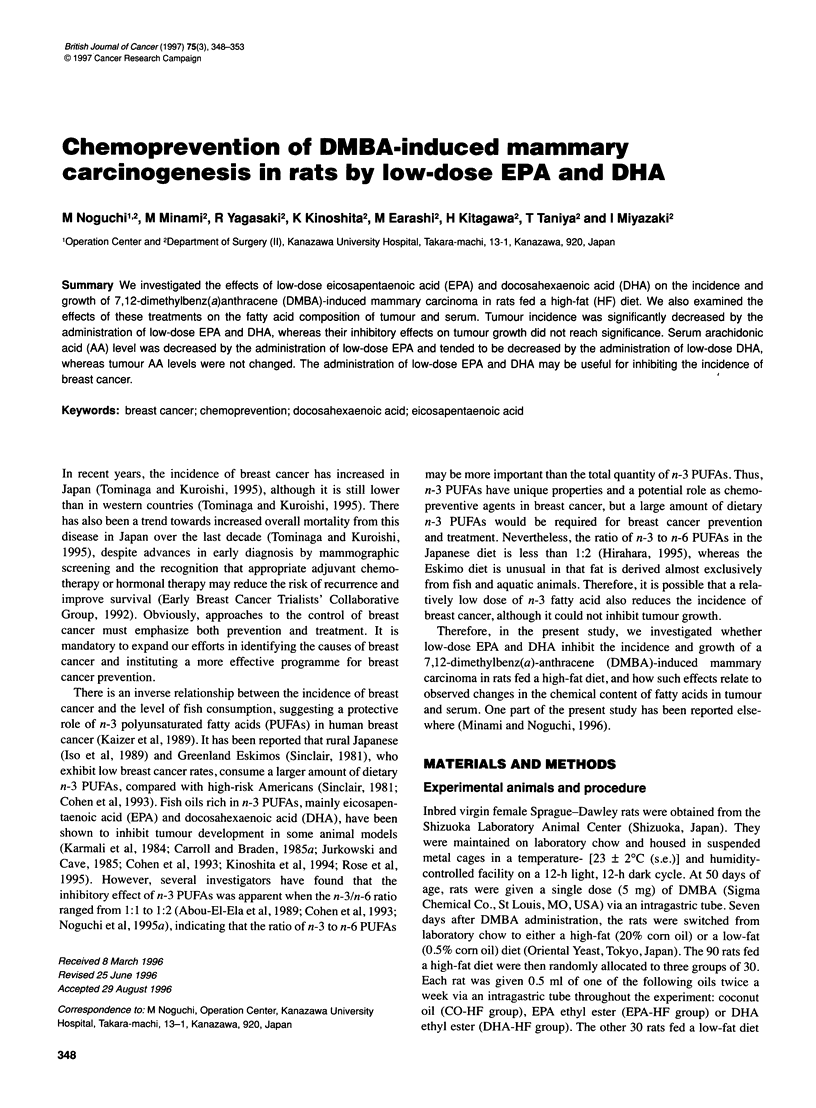
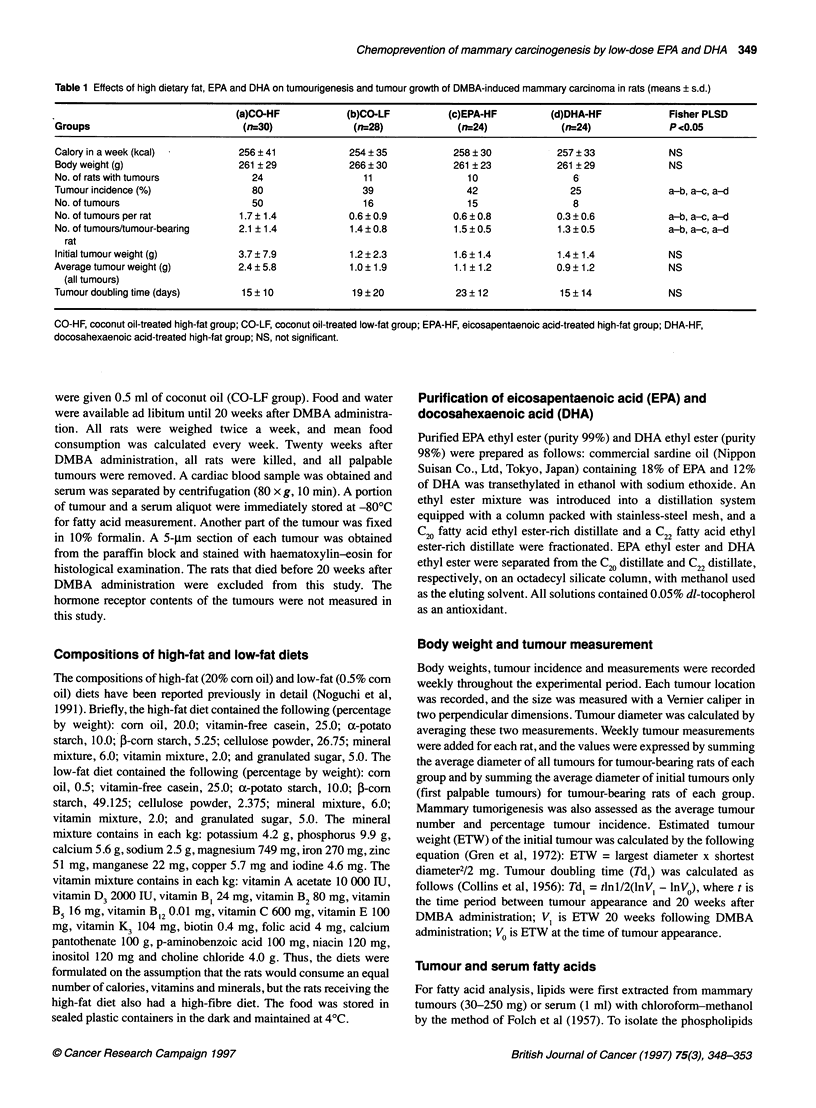
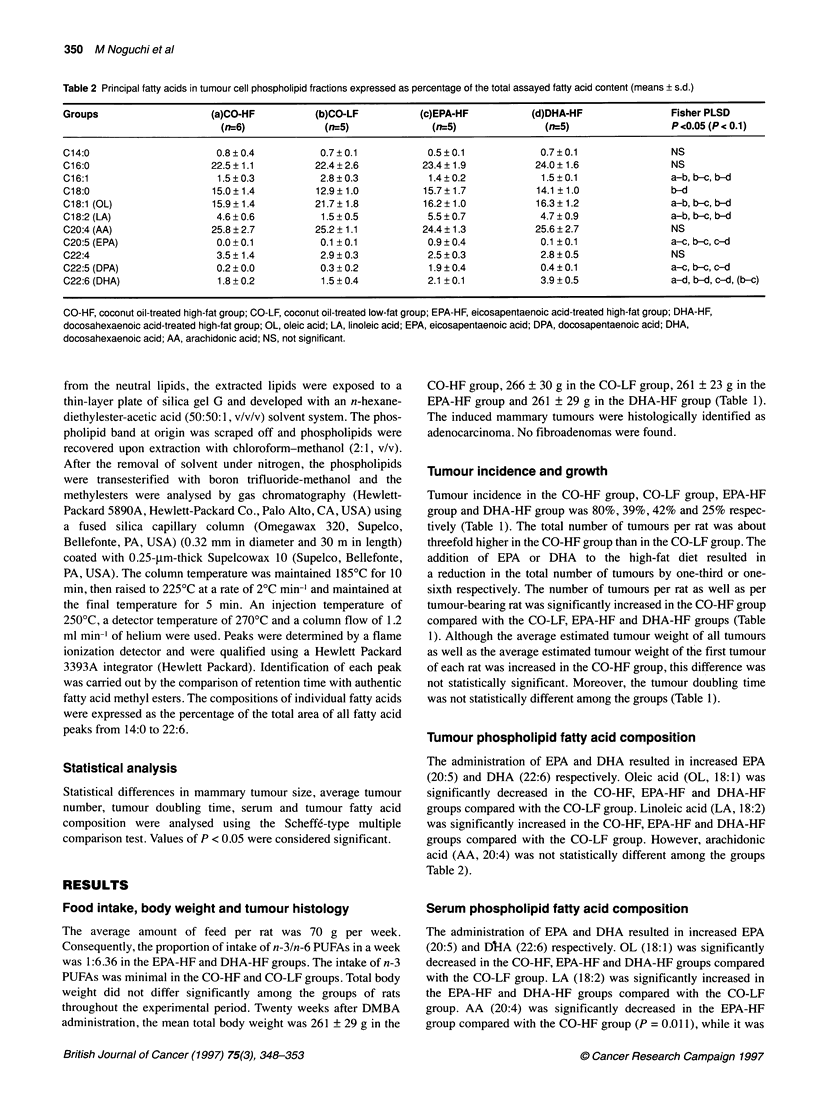
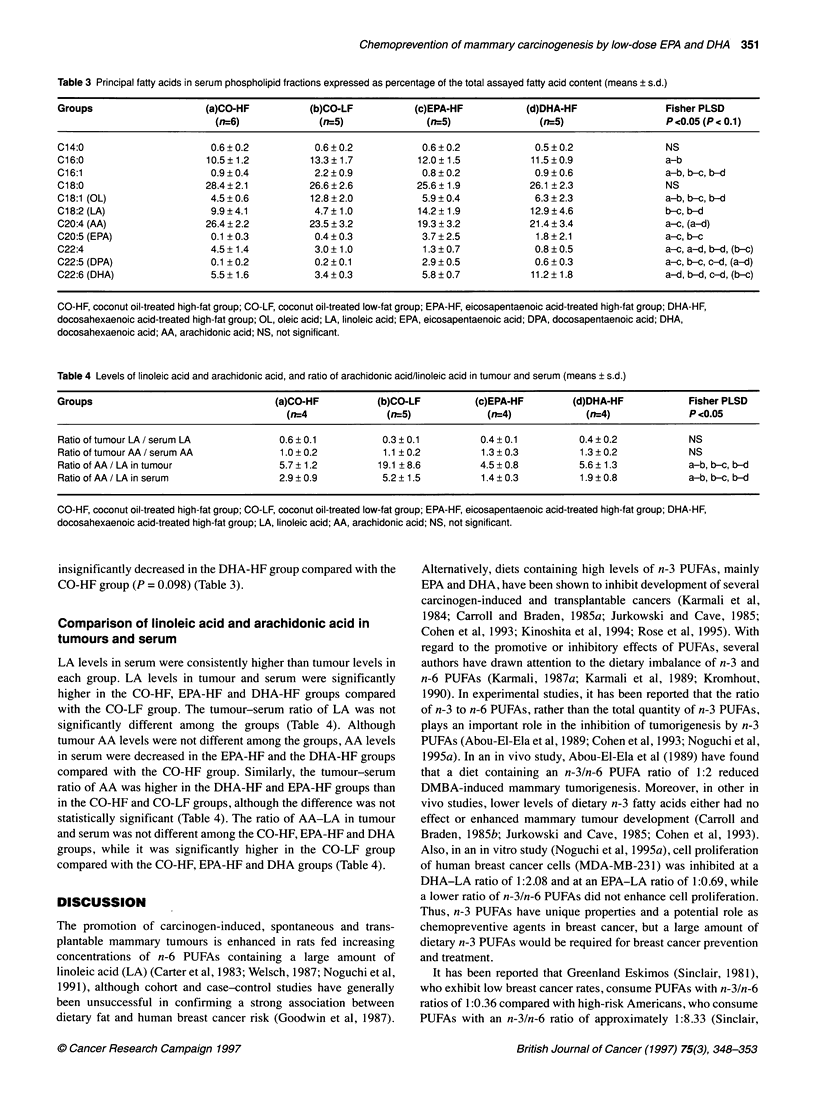
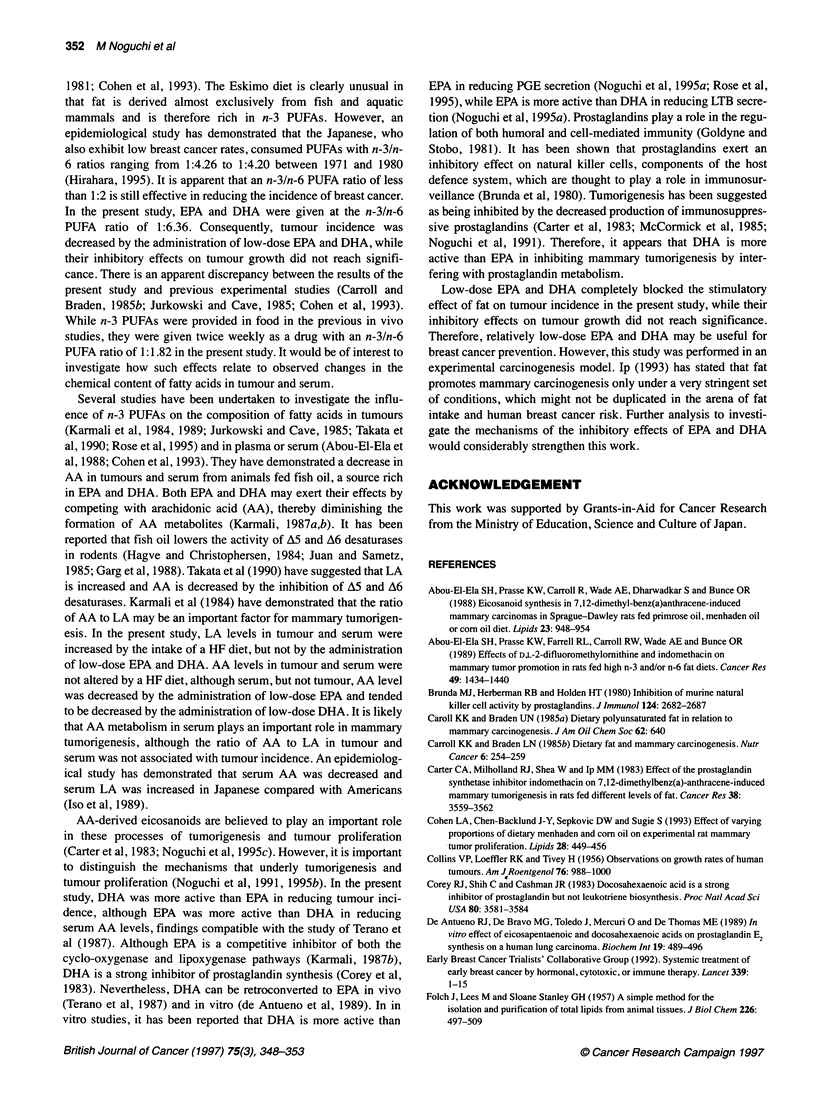

Selected References
These references are in PubMed. This may not be the complete list of references from this article.
- Abou-el-Ela S. H., Prasse K. W., Carroll R., Wade A. E., Dharwadkar S., Bunce O. R. Eicosanoid synthesis in 7,12-dimethylbenz(a)anthracene-induced mammary carcinomas in Sprague-Dawley rats fed primrose oil, menhaden oil or corn oil diet. Lipids. 1988 Oct;23(10):948–954. doi: 10.1007/BF02536342. [DOI] [PubMed] [Google Scholar]
- Abou-el-Ela S. H., Prasse K. W., Farrell R. L., Carroll R. W., Wade A. E., Bunce O. R. Effects of D,L-2-difluoromethylornithine and indomethacin on mammary tumor promotion in rats fed high n-3 and/or n-6 fat diets. Cancer Res. 1989 Mar 15;49(6):1434–1440. [PubMed] [Google Scholar]
- Brunda M. J., Herberman R. B., Holden H. T. Inhibition of murine natural killer cell activity by prostaglandins. J Immunol. 1980 Jun;124(6):2682–2687. [PubMed] [Google Scholar]
- COLLINS V. P., LOEFFLER R. K., TIVEY H. Observations on growth rates of human tumors. Am J Roentgenol Radium Ther Nucl Med. 1956 Nov;76(5):988–1000. [PubMed] [Google Scholar]
- Carter C. A., Milholland R. J., Shea W., Ip M. M. Effect of the prostaglandin synthetase inhibitor indomethacin on 7,12-dimethylbenz(a)anthracene-induced mammary tumorigenesis in rats fed different levels of fat. Cancer Res. 1983 Aug;43(8):3559–3562. [PubMed] [Google Scholar]
- Cohen L. A., Chen-Backlund J. Y., Sepkovic D. W., Sugie S. Effect of varying proportions of dietary menhaden and corn oil on experimental rat mammary tumor promotion. Lipids. 1993 May;28(5):449–456. doi: 10.1007/BF02535944. [DOI] [PubMed] [Google Scholar]
- Corey E. J., Shih C., Cashman J. R. Docosahexaenoic acid is a strong inhibitor of prostaglandin but not leukotriene biosynthesis. Proc Natl Acad Sci U S A. 1983 Jun;80(12):3581–3584. doi: 10.1073/pnas.80.12.3581. [DOI] [PMC free article] [PubMed] [Google Scholar]
- FOLCH J., LEES M., SLOANE STANLEY G. H. A simple method for the isolation and purification of total lipides from animal tissues. J Biol Chem. 1957 May;226(1):497–509. [PubMed] [Google Scholar]
- Garg M. L., Sebokova E., Thomson A. B., Clandinin M. T. Delta 6-desaturase activity in liver microsomes of rats fed diets enriched with cholesterol and/or omega 3 fatty acids. Biochem J. 1988 Jan 15;249(2):351–356. doi: 10.1042/bj2490351. [DOI] [PMC free article] [PubMed] [Google Scholar]
- Goodwin P. J., Boyd N. F. Critical appraisal of the evidence that dietary fat intake is related to breast cancer risk in humans. J Natl Cancer Inst. 1987 Sep;79(3):473–485. [PubMed] [Google Scholar]
- Hagve T. A., Christophersen B. O. Effect of dietary fats on arachidonic acid and eicosapentaenoic acid biosynthesis and conversion to C22 fatty acids in isolated rat liver cells. Biochim Biophys Acta. 1984 Nov 14;796(2):205–217. doi: 10.1016/0005-2760(84)90349-7. [DOI] [PubMed] [Google Scholar]
- Ip C. Controversial issues of dietary fat and experimental mammary carcinogenesis. Prev Med. 1993 Sep;22(5):728–737. doi: 10.1006/pmed.1993.1067. [DOI] [PubMed] [Google Scholar]
- Iso H., Sato S., Folsom A. R., Shimamoto T., Terao A., Munger R. G., Kitamura A., Konishi M., Iida M., Komachi Y. Serum fatty acids and fish intake in rural Japanese, urban Japanese, Japanese American and Caucasian American men. Int J Epidemiol. 1989 Jun;18(2):374–381. doi: 10.1093/ije/18.2.374. [DOI] [PubMed] [Google Scholar]
- Juan H., Sametz W. Dihomo-gamma-linolenic acid increases the metabolism of eicosapentaenoic acid in perfused vascular tissue. Prostaglandins Leukot Med. 1985 Jul;19(1):79–86. doi: 10.1016/0262-1746(85)90162-3. [DOI] [PubMed] [Google Scholar]
- Jurkowski J. J., Cave W. T., Jr Dietary effects of menhaden oil on the growth and membrane lipid composition of rat mammary tumors. J Natl Cancer Inst. 1985 May;74(5):1145–1150. [PubMed] [Google Scholar]
- Kaizer L., Boyd N. F., Kriukov V., Tritchler D. Fish consumption and breast cancer risk: an ecological study. Nutr Cancer. 1989;12(1):61–68. doi: 10.1080/01635588909514002. [DOI] [PubMed] [Google Scholar]
- Karmali R. A., Donner A., Gobel S., Shimamura T. Effect of n-3 and n-6 fatty acids on 7,12 dimethylbenz (a) anthracene-induced mammary tumorigenesis. Anticancer Res. 1989 Jul-Aug;9(4):1161–1167. [PubMed] [Google Scholar]
- Karmali R. A. Eicosanoids in neoplasia. Prev Med. 1987 Jul;16(4):493–502. doi: 10.1016/0091-7435(87)90063-6. [DOI] [PubMed] [Google Scholar]
- Karmali R. A. Fatty acids: inhibition. Am J Clin Nutr. 1987 Jan;45(1 Suppl):225–229. doi: 10.1093/ajcn/45.1.225. [DOI] [PubMed] [Google Scholar]
- Karmali R. A., Marsh J., Fuchs C. Effect of omega-3 fatty acids on growth of a rat mammary tumor. J Natl Cancer Inst. 1984 Aug;73(2):457–461. doi: 10.1093/jnci/73.2.457. [DOI] [PubMed] [Google Scholar]
- Kinoshita K., Noguchi M., Earashi M., Tanaka M., Sasaki T. Inhibitory effects of purified eicosapentaenoic acid and docosahexaenoic acid on growth and metastasis of murine transplantable mammary tumor. In Vivo. 1994 May-Jun;8(3):371–374. [PubMed] [Google Scholar]
- Kromhout D. The importance of N-6 and N-3 fatty acids in carcinogenesis. Med Oncol Tumor Pharmacother. 1990;7(2-3):173–176. doi: 10.1007/BF02988545. [DOI] [PubMed] [Google Scholar]
- McCormick D. L., Madigan M. J., Moon R. C. Modulation of rat mammary carcinogenesis by indomethacin. Cancer Res. 1985 Apr;45(4):1803–1808. [PubMed] [Google Scholar]
- Minami M., Noguchi M. Effects of low-dose eicosapentaenoic acid, docosahexaenoic acid and dietary fat on the incidence, growth and cell kinetics of mammary carcinomas in rats. Oncology. 1996 Sep-Oct;53(5):398–405. doi: 10.1159/000227595. [DOI] [PubMed] [Google Scholar]
- Noguchi M., Earashi M., Minami M., Kinoshita K., Miyazaki I. Effects of eicosapentaenoic and docosahexaenoic acid on cell growth and prostaglandin E and leukotriene B production by a human breast cancer cell line (MDA-MB-231). Oncology. 1995 Nov-Dec;52(6):458–464. doi: 10.1159/000227511. [DOI] [PubMed] [Google Scholar]
- Noguchi M., Earashi M., Miyazaki I., Tanaka M., Sasaki T. Effects of indomethacin with or without linoleic acid on human breast cancer cells in vitro. Prostaglandins Leukot Essent Fatty Acids. 1995 Jun;52(6):381–386. doi: 10.1016/0952-3278(95)90065-9. [DOI] [PubMed] [Google Scholar]
- Noguchi M., Rose D. P., Earashi M., Miyazaki I. The role of fatty acids and eicosanoid synthesis inhibitors in breast carcinoma. Oncology. 1995 Jul-Aug;52(4):265–271. doi: 10.1159/000227471. [DOI] [PubMed] [Google Scholar]
- Rose D. P., Connolly J. M., Rayburn J., Coleman M. Influence of diets containing eicosapentaenoic or docosahexaenoic acid on growth and metastasis of breast cancer cells in nude mice. J Natl Cancer Inst. 1995 Apr 19;87(8):587–592. doi: 10.1093/jnci/87.8.587. [DOI] [PubMed] [Google Scholar]
- Sinclair H. M. The relative importance of essential fatty acids of the linoleic and linolenic families: studies with an Eskimo diet. Prog Lipid Res. 1981;20:897–899. doi: 10.1016/0163-7827(81)90167-3. [DOI] [PubMed] [Google Scholar]
- Takata T., Minoura T., Takada H., Sakaguchi M., Yamamura M., Hioki K., Yamamoto M. Specific inhibitory effect of dietary eicosapentaenoic acid on N-nitroso-N-methylurea-induced mammary carcinogenesis in female Sprague-Dawley rats. Carcinogenesis. 1990 Nov;11(11):2015–2019. doi: 10.1093/carcin/11.11.2015. [DOI] [PubMed] [Google Scholar]
- Tominaga S, Kuroishi T. Epidemiology of Breast Cancer in Japan. Breast Cancer. 1995 Apr 30;2(1):1–7. doi: 10.1007/BF02966890. [DOI] [PubMed] [Google Scholar]
- Welsch C. W. Enhancement of mammary tumorigenesis by dietary fat: review of potential mechanisms. Am J Clin Nutr. 1987 Jan;45(1 Suppl):192–202. doi: 10.1093/ajcn/45.1.192. [DOI] [PubMed] [Google Scholar]
- de Antueno R. J., de Bravo M. G., Toledo J., Mercuri O., De Tomás M. E. In vitro effect of eicosapentaenoic and docosahexaenoic acids on prostaglandin E2 synthesis in a human lung carcinoma. Biochem Int. 1989 Sep;19(3):489–496. [PubMed] [Google Scholar]


